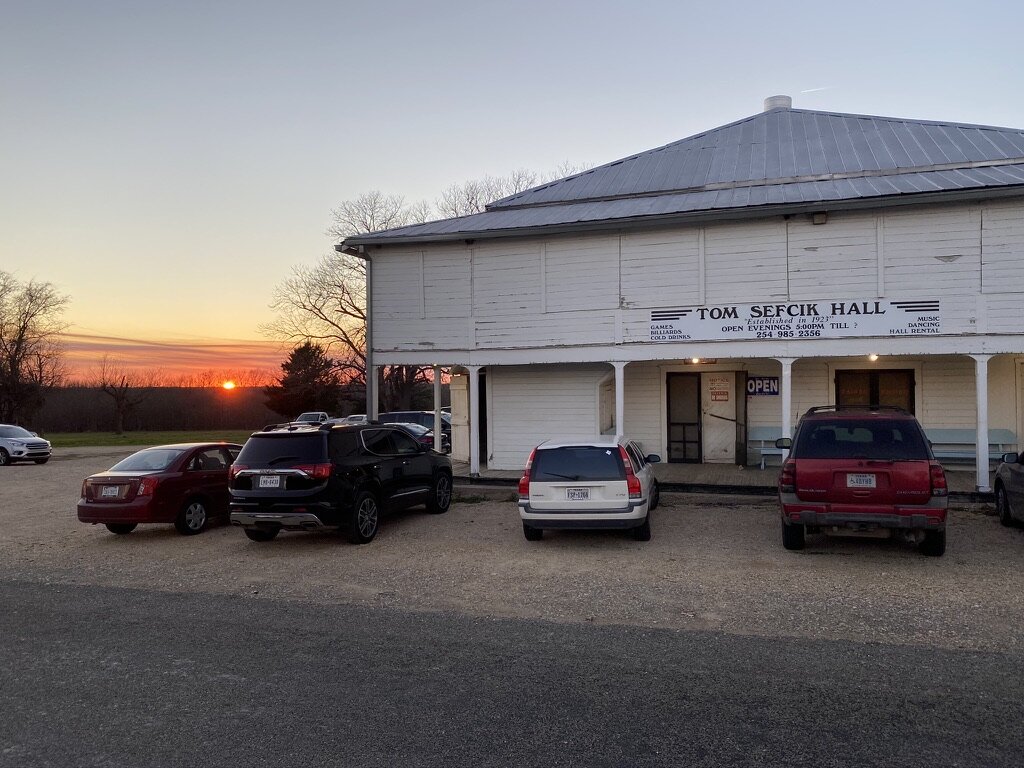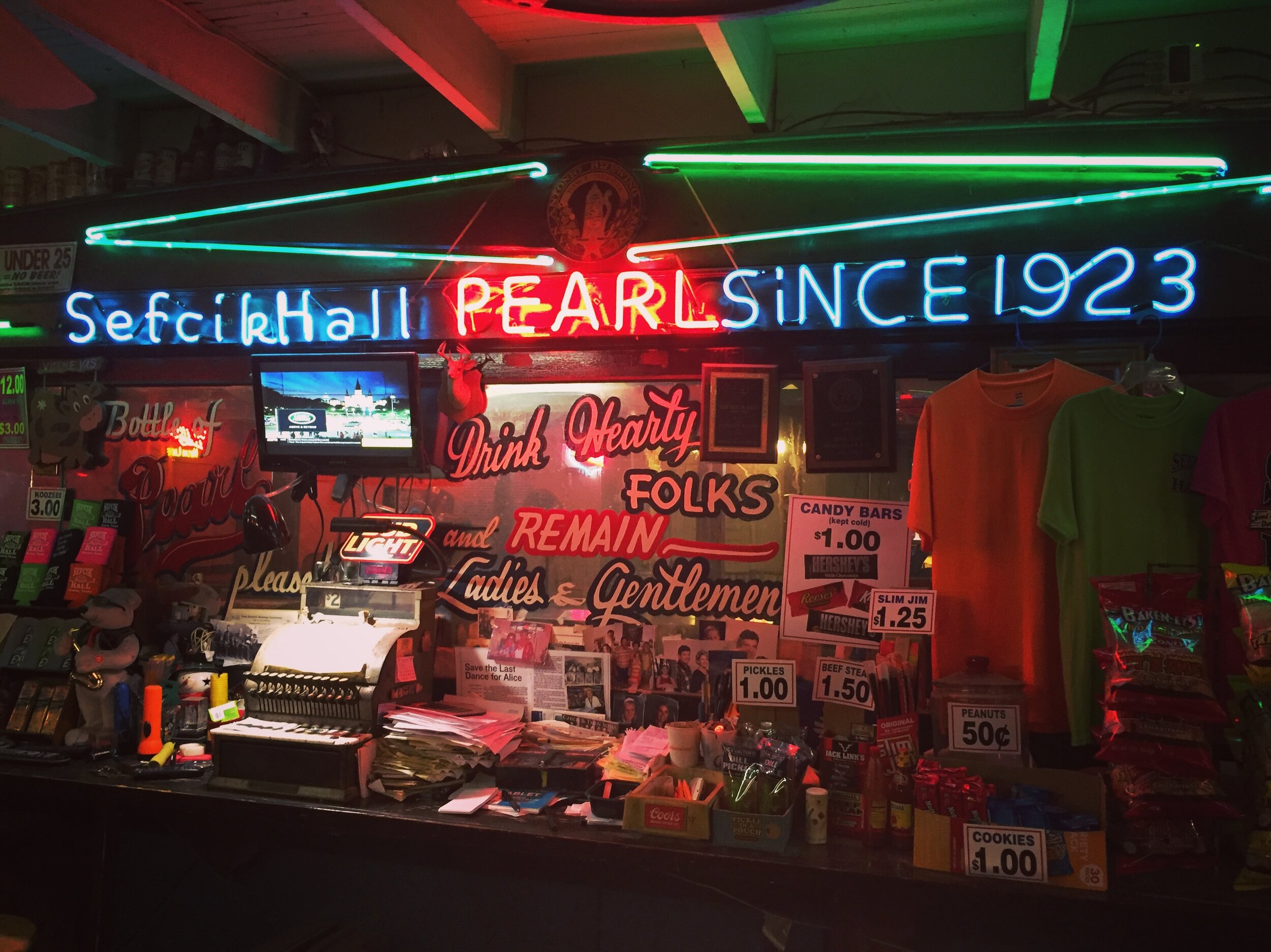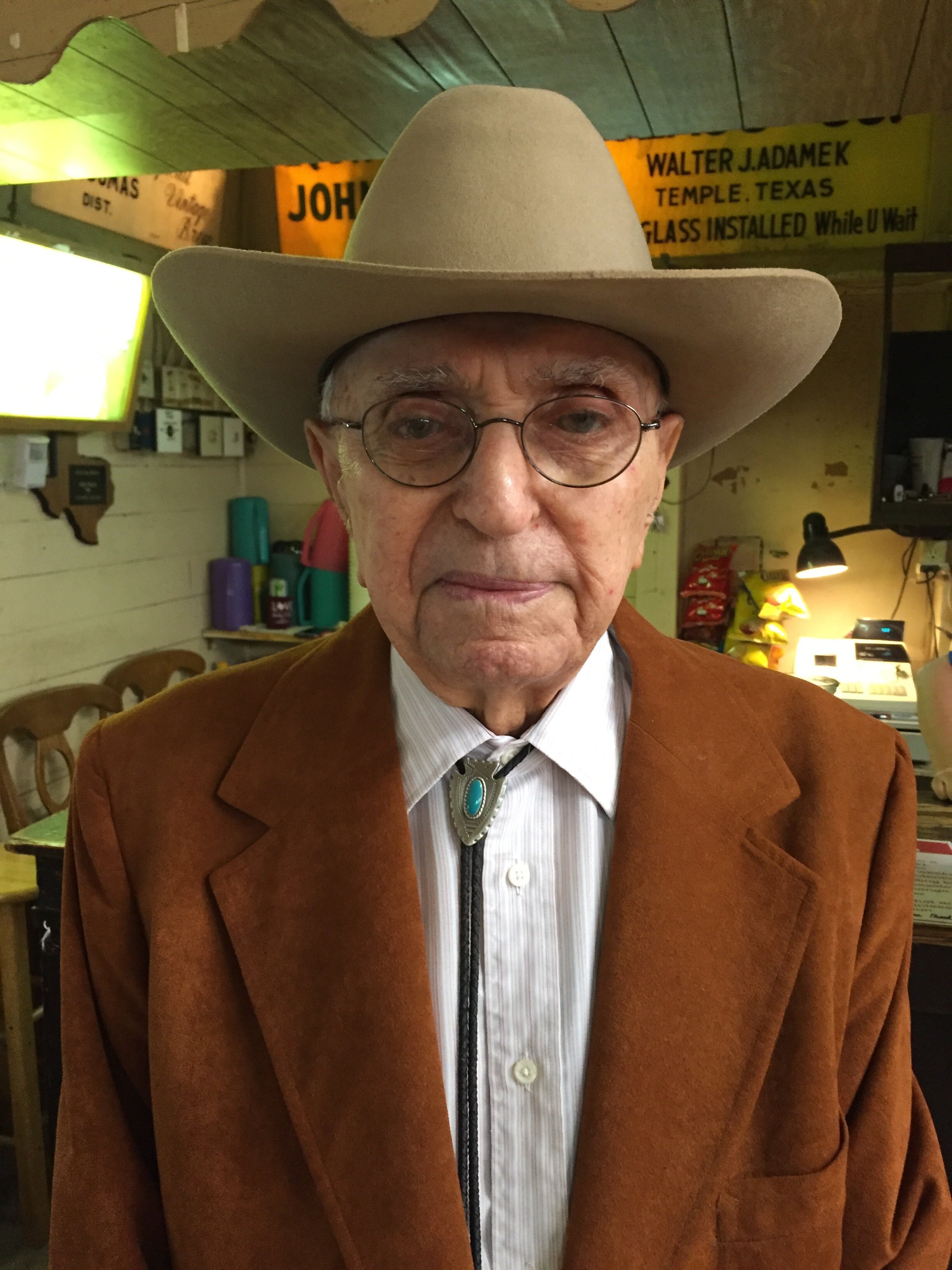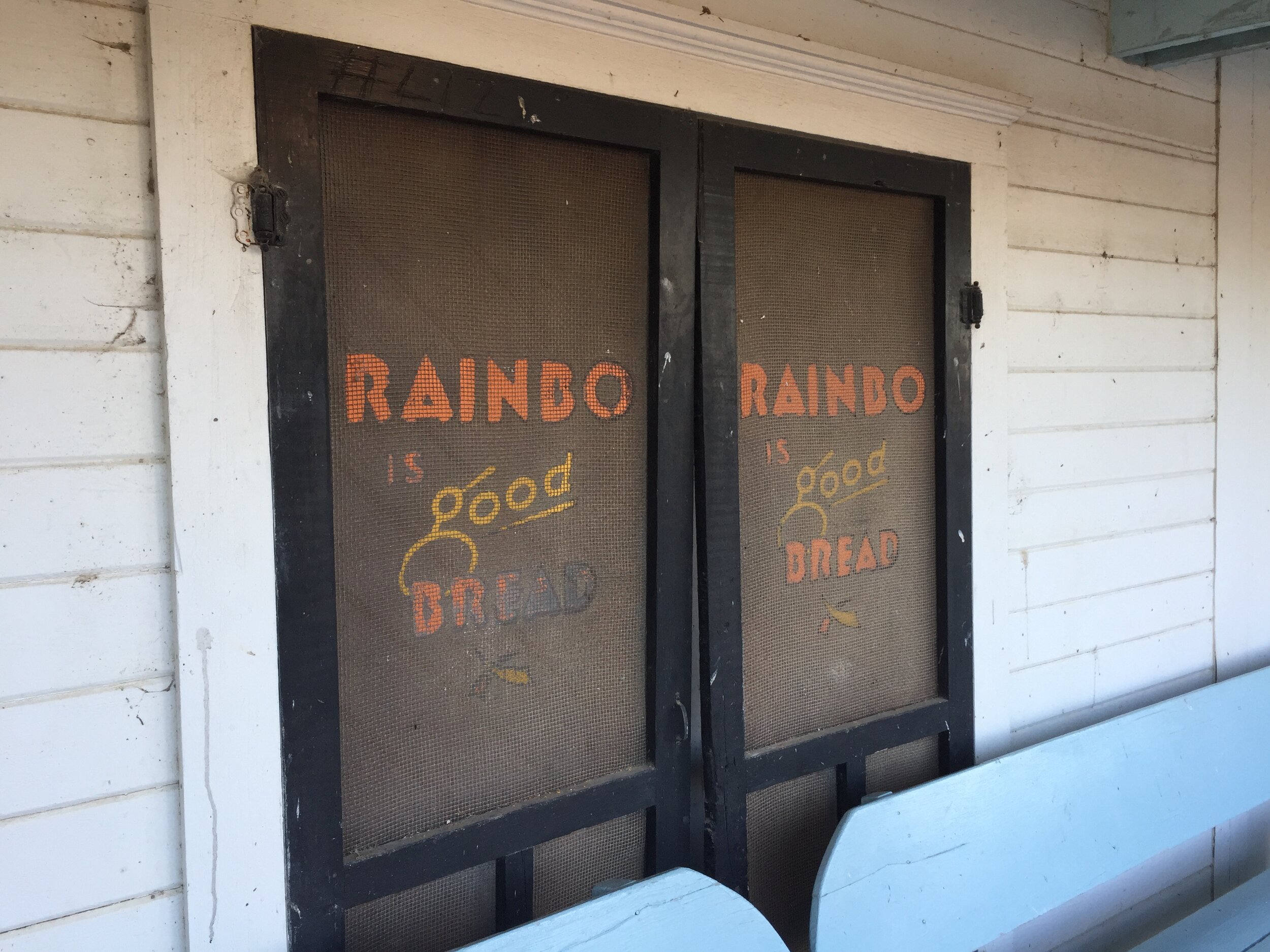Episode 2 - Postcard from Seaton, “Sundays at Sefcik Hall”
Seaton, TX hasn’t had a post office since 1907, and as of last count, its population hovered somewhere around 40. Situated on a lonely stretch of highway, about ten miles east of Temple, it’s not on most maps and is easy to miss. Yet, on Sundays, this town comes alive when couples gather, as they have for nearly 100 years, to dance at Tom Sefcik Hall. We’ll spend an evening getting to know the family that’s kept this place running for generations, share both laughs and tears with a few regulars, and learn about how spaces like these shaped Texas culture as we know it. We’ll also get a little lesson in Czech!
Interested in visiting Tom Sefcik Hall? Check them out on - facebook
Care to learn more about dance halls you can visit, and aid in their preservation? Go to - texasdancehall.org
__________________________________________________________________________
TRANSCRIPT
(Please note as this transcript was obtained via a computerized service, please forgive any typos)
Evan (00:01):
This project has been a labor of love. It's also been a tremendous leap of faith. And now that everything's in the can, I think I can confess that beyond a few ideas, I really hadn't given much thought as to how all of this was going to shape up. But sometimes the best road trips involve a journey into the unknown. And that's absolutely what today's episode was for me. Last January, I'd never heard of Seaton, Texas, and honestly think I'd only driven North of Georgetown three times in my life. This place didn't come recommended to me through friends, and I didn't really know what to expect in going. But ultimately, it stole my heart, and I trust you'll understand why when we spend an evening getting to know the owners and two steppers at Tom Sefcik Hall. I'm Evan Stern, and this is Vanishing Postcards,
Kenny Sulak (01:11):
Like a little, little one horse down. You know, they used to have a convenience store slash gas station on the main highway, but that, that closed up and went its way a few years ago. And, uh, just to have a little school up the street there that I went to school, I walked to school. Uh, it's a, sounds like a cliche, but I actually walked to school when I was in elementary. Uh, it wasn't three miles through snow, but it was a quarter of a mile or almost a half a mile there. And I had to, whether it was raining or what I walked to school. Um, but it's just a little small, little tight knit communities. What it was
Evan (01:48):
Kenny Sulak was born, raised and still lives in Seaton, Texas. So does his mother, so did his grandparents and don't ask him how many before that, because he just can't tell you. After all, before a few bureaucrats in Washington decided otherwise, this town was once named for his family.
Kenny Sulak (02:08):
At one time, it was called Sefcikville. And that was my grandfather's name, Sefcik.
Evan (02:15):
Try searching for Seaton on your car's GPS and like mine, it might come up dry. Basically, it's a cluster of homes, nestled on a stretch of highway 53 in Bell County, about nine miles East of Temple. They haven't had a post office since 1907. And as of last count, it's population hovered somewhere around 40. But if you hang a right on the road before the old Brethren Church, just a few yards past the cemetery, towering over the plains, you'll happen upon a large two storied wooden building of peeling white paint. At first glance, it could be mistaken for a barn, but if you come here on a Sunday, as I did the number of trucks, jockeying for space in the grass and gravel outside just might cause you to blink. This is Tom Sefcik Hall, and as has happened now for nearly 100 years, a dance is about to begin.
New Speaker (03:13):
My Mama said that a dusty boot will make you trip. So you got to shake the dust off all the time. This is my beautiful wife over here, and her name's Roberta. She loves it too.
New Speaker (03:28):
Uh, to me, it's like when we go out of town and we try to find places to dance, and then we come here, it's like coming home.
New Speaker (03:36):
It's a family place where everybody can have fun and enjoy life. Uh, my fun is dancing with my wife and anyone who wants to dance with me. Okay?
New Speaker (03:49):
Well, everybody's little older than what they were when I used to come here as a teenager. But anyway, it was a good experience then, and it's still a good experience. Things haven't changed that much. And that's great.
Evan (04:05):
There have been a few changes. The old timers will tell you that back in 1971, they enclosed the open air second floor to install AC and the bar downstairs once housed a general store. But looking at the original illuminated painted glass ads for Jax, Pearl and Falstaff beers above the dance floor, it's pretty easy to infer that things progress a little slower around here. More than this, though, when you spend a night at Sefcik Hall, you're participating in the continuation of a long, proud yet potentially fading history,
Kenny Sulak (04:41):
Uh, dance halls, or I hate to say it because I grew up dancing every weekend when I was young. That's all you ever did every weekend. You just, you find out where you went, your friends are done. Hey, so-and-so's playing at this place. And Saturday and Sunday, you know, you're going to go there. Yeah, it will be there. And that's the way you associate it. Now it's, everybody's, everybody's on their phone,
Evan (05:05):
Starting in the 1800s, fleeing crushing poverty and lured by the promise of cheap land Czechs and Germans began migrating en masse to Texas. This journey wasn't an easy one to say the least, but eventually these newcomers established farming settlements that wouldn't have been entirely out of place in regions like Bohemia. And judging from the names of tonight's patrons, their children are still here.
Deb Fleming (05:31):
[inaudible] Johnny Plsek, P L S E K
Evan (05:37):
I owe the gift of life to people like this, myself. So does Deb Fleming, whose family migrated here from Poland in the 1850s, and today works tirelessly as the executive director of Texas Dance Hall Preservation. Speaking in her office in Austin, she told me of how these spaces were born
Deb Fleming (05:55):
And the Germans and the poles and the Czechs came
Deb Fleming (05:58):
from Europe. And they were, they brought all those traditions with them from their culture, you know, in the old country. And they wanted to keep that culture alive and those traditions alive because that's all that they knew in this new, new world they were in. And, and so they held onto those and they recreated those. And, and these places were really community gathering places, but it was a matter of, you know, if people wanted to have a place to come together, you know, for some entertainment and fellowship and music and dance, they would figure out a way to do that. You know, and it didn't have to be anything fabulous or, or, or extravagant. It was just the coming together of the people in that community. To me, the dance halls are about the people, as much as the buildings and the people is what really keeps those places alive, both their stories, their memories, and the places, you know, that's through the backdrop to, to all the stories.
Evan (06:50):
So integral where these halls that at one time, they numbered over 1000 today, though, fewer than 400 remain and of those that are left, about a quarter are believed to be in danger of destruction and not many operate as regularly as this one. That's something Kenny's wife, Irene, seems to echo as she prepares to send up a tray of concessions on the building's original and very much working dumbwaiter.
Irene Sulak (07:12):
Sefcik Hall is like going back in time. A lot of people say, uh, it's an old dance hall where, um, a lot of people have met here, uh, gotten married here and then they come back and have their 30 or 50th anniversary. Um, so it's, um, it's, it's a place that really, you don't find a lot of places like this anymore. They don't exist.
Evan (07:34):
The Sulaks themselves are one of those couples. They met at age 12 when Irene's family put her to work, doing odd jobs for Kenny's mother, Alice, and have been official now for 32 years, you'll still find them cracking beers here every week, Friday through Sunday, which they'll admit, isn't always easy given that they each hold full-time jobs.
Kenny Sulak (07:54):
You know, it's only open three days a week. Now, the way it's run now, it makes a living and it pays for itself. And it pays for my mother, but my wife and we don't collect no salary for doing this. It's just helping her out. If we make any tips, that's fine, but it wouldn't support me as a job as it is now as his current condition, you know, it's a different way of life. So, you know, sometimes I, uh, sometimes I wish I had that other way of life. Cause this is you're, you're really married to your job. It's like our life. So it's got its ups and downs
Evan (08:34):
For the Sulaks, this work is a labor of love and the force of nature who deserves the most credit for keeping Sefcik running this long is again Alice, the short 89 year old, former saxophonist Spitfire, whom Deb tells me is probably the longest serving female dance hall owner in Texas. In fact, she almost single-handedly kept doors of the bar open seven nights a week for almost 45 years.
Irene Sulak (08:59):
Alice, um, to me, she's like my second mother. Um, she's a very sweet lady. She was a very hardworking lady, but she just can't play her saxophone anymore, and her back- She has issues with her back and she's just, you know, physically not capable of doing the things she used to do, but she ran the bar and you know, did everything here.
Kenny Sulak (09:20):
Uh, my mother's real old school. And even if she hears somebody cussing using the F word, uh, she doesn't like it. She goes, "My daddy never allowed that kind of language in here. And I don't like it either. And you're, you're not going to be talking like that in here." She goes, "It's real, disrespectful." And she'll, she'll tell people that right in a heartbeat, "Don't be using that language in here." And they look at her and go, "Okay!" If they don't, then they usually leave.
Evan (09:51):
I should mention that behind Kenny's perch at the bar hangs a painted mirror that reads an ornate cursive "Drink hearty folks, and remain ladies and gentlemen!" And if you talk about Alice with the regulars, they're likely to mention her sweetness and strictness in the same breath.
Dorothy (10:08):
But my dad was sitting down there one time and they were doing the bunny hop here. And have you been downstairs? Okay. They've reinforced those beams. That ceiling would go- Woo, woop!. And she made us quit doing the bunny hop. Alice, did. No more bunny hop. She was strict. No, uh, no twist, nothing like that. She wanted it clean.
Evan (10:32):
So the twist was too frisky for, Alice?
Dorothy (10:34):
I guess so. It was according to Alice.
Evan (10:38):
Even today, when you walk inside, you'll be greeted by a sign that states in no uncertain terms that "Anyone directly or indirectly involved in a fight on these premises can and will be barred. Sefcik Hall strives to run a business where people of all ages can enjoy a friendly environment and not have to worry about getting involved in a fight. Sefcik Hall neither desires nor wants anybody's business who intends to start trouble here". But it sounds as a few troublemakers ever had a prayer against Alice.
Dorothy (11:07):
When she was still up here, she would not let any, she never had a bouncer here. She'd have a big old broom. And if somebody got to cutting up too much, a little bit too much to drink, she'd take that broom and she'd hit tehm on the behind, and everything, and they'd just go tumbling down those stairs.
Dancer (11:28):
And mama, she always carried her broom around to make sure everybody walked the straight and narrow. So, you know, otherwise, she wasn't playing that saxophone. She was doing all right.
Evan (11:41):
Well, t's been a while since Alice has been on broom duty. As I understand after years of carrying ice, she rarely ventures upstairs anymore. And Kenny and Irene handle most of the work now. Most sobering, on the day I was to meet this fabled matriarch, she took a fall, was rushed to the ER and has since taken up residence in rehab. But when I broach the subject of the future, Kenny seems resolute.
Kenny Sulak (12:07):
Oh, I was, I can still remember being in a play pen back in the back corner of the building when I was probably three years old. It's just vague memories, but memories, nevertheless. And this is, you know, I've, I've grown up here, you know, and this is all I've ever known was this, you know, this is what my social life was really. You know, I think even now with, you know, helping out my mom and, and running the hall and stuff for it. And then, uh, it's still a place to I come here and I meet people and I socialize and I think, well, you know, how, what would I do if, if I didn't have the place? I would just set at home or go out and go, or would my wife and me go out to socialize? Or what? And they, here everybody comes here. Your socialize here.
Evan (13:01):
For Kenny, this place seems to fill a need. And Irene tells me that while their roles may evolve, they and their daughters, if needed, are committed to pitching in to keep the doors open.
Irene Sulak (13:12):
Um, somehow some way, whether, you know, it takes, um, all of us to get involved. We really do want to see it. And then the people that come to the dances on Sunday, they really, um, are adamant about wanting to have a place to go when they hope that the hall will continue. Um, you know, even if you know, Alice isn't able to do it, that will continue. Uh, so they have something to do.
Evan (13:35):
I think of the Sulak family and all of this, when Deb tells me why dance halls are important to her.
Speaker 3 (13:41):
Well, I think because it's part of our history, it's part of who we are. And, uh, we've gotten away from a lot of that. And those places are very heartfelt. So I get emotional about it because they are special. I see so many people working so hard to keep these places going. There's a lot of hard work. It's not just about the fun. And the dancing- it's about cleaning the toilets, you know, fixing the roof, you know, uh, raking the leaves away from the building to make sure they're not a fire hazard. I mean, it's, it's a lot of hard work and it's not just about, you know, setting the band up and playing the music and dancing. It's it's about so much more
Evan (14:29):
For those who go to Sefcik regularly, the Sunday dances are also clearly about far more for them too. As the clock nears six, I head up the building's rickety wooden staircase and upon entering the Hall am immediately met by a striking old man in an impeccable tan suit, pressed white shirt, bolo tie, and Stetson. Taking an interest in my sound equipment, he introduces himself with a smile as Johnny and promises he's the oldest one here
Johnny (15:00):
In May the 30th, I'll be a hundred. If I live that long. Hopefully I'll be here on may 30th. I want to make that hundred years. I've been dancing 82 years.
Evan (15:17):
And what does dancing do for you?
Johnny (15:19):
Dancing is the best exercise, and you enjoy it and, I just love to dance. Last year, one night over here, I danced with 32 different women.
Evan (15:37):
Amazed. I ask if he could remember the first time he came here and without prompting proceeded to tell me far more.
Johnny (15:44):
17 years old, my brother got married. Yeah. And I was the best man. I was in chemical warfare. And spent the two years in Iceland and then, we stopped off at England, and went to Normandy. And then in Germany, I got transferred into a different outfit. A young outfit. And I had seniority. So they sent me home for 45 days rest and recuperation. And that's when I met met, my wife, two years later, I married her. And when my wife died four years ago, uh, well, I didn't go, nowhere. Nothing to do. And I thought, well, maybe it's time to just die. And my niece come here a whole lot, one day, she said, "We're taking you to Tom Sefcik. I said, "No, I don't want to." And she said, "We're gonna pick you up. You can listen to the band." Jerry Haisler was playing. I said, yeah, I can do that. And then we got over here and my niece said, "Let's dance!" And I told her, "Man, I haven't danced in I don't know how many years." And she said, "Let's try it- Once you dance, once you ride the bicycle, you can always ride again. And I think that's, that's why I live this long.
Evan (17:32):
Seemingly on cue. The lights dim as colored strands flicker above and tonight's band, a Western group called out Out of the Blue launches into a Charley Pride cover. Within moments, Johnny has found a willing partner and is on the floor, which is promptly filling with couples. Noticing me on the sidelines, one guest gives me an affectionate nudge, accompanied by a few words of unsolicited advice,
Dancer (17:58):
Man, who dance are always with very attractive women. And the only time a man can be in charge of his wife for two or three minutes at a time is on the dance floor. So men need to take up dancing!
Evan (18:13):
Feeling conspicuous, I introduce myself to Johnny's niece, Dorothy, who tells me that despite going back in Texas a few generations, like her uncle, her first language was Czech... Can you still speak some Czech?
Dorothy (18:25):
I can speak some.
Evan (18:26):
Could you speak some for me right now?
Dorothy (18:29):
[Czech] what is your name? And I said, (Czech) good day and (Czech) is, "How are you?" Um, I've lost a lot of it. I've learned back a lot of it by dancing to the music and singing to the songs that Czech songs that when we have a band here, Jerry Haisler, when he plays that a lot of the songs are still in Czech. They sing them.
Evan (18:59):
Chatting with Dorothy. I'm reminded that while Hollywood has conditioned us to believe that Texas was settled by Cowboys in the mold of John Wayne, most of it was built by immigrants with names like Kolkhorst, Sefcik, Sulak, Rodriguez. And I'll go ahead and include Stern. What's more as Deb andKenny will tell you, dance halls like these aren't just a part of Texas culture. They're where so much of Texas culture was defined.
Deb Fleming (19:25):
To me why these places are so important to preserve is because they tell the story of Texas in a different way than the Alamo does. Uh, the Alamo is about the struggle for, you know, the land and the governmental kinds of things, and the governance. But it was these halls that really sort of tell the story of the people, why they came here, why they stayed, and the ones that stayed, were rugged individuals. And I think that's what gives us sort of our independence here.
Kenny Sulak (19:56):
Yeah, you look at the building in 2023, this building's going to be a hundred years old. If you look at it from a European perspective, well, that's a hundred years is a drop in a bucket. In the United States, a hundred years is old. That's old and people, people want to experience stuff like that and learn how things were, because that's nothing that you're going to find in a local history book. You know, they, they, people yearn to hear how things were because they've never had a chance to experience it.
Evan (20:30):
I've already decided I'm coming back. I want to check out one of their polka nights. Also, I have to meet Alice who Kenny promises me won't be down for long.
Deb Fleming (20:40):
If she's got to crawl on her hands and knees, she'll be back sitting behind the bar here in probably a month, month and a half
Evan (20:50):
On my way out. I say goodbye to Dorothy and Johnny and ask him with a wink. What's your favorite thing to do on a Sunday night? He answers in Czech.
Johnny and Dorothy (21:14):
[inaudible]
Evan (21:15):
In case you didn't hear Dorothy, that means dancing
Speaker 7 (22:54):
[inaudible].



